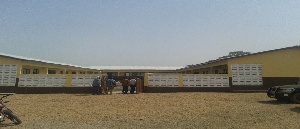The Garu-Tempane District in the Upper East Region has over the past two years recorded several infrastructural developments.
Briefing the media at Garu after field visits, the District Chief Executive (DCE), Mr Albert Akuka Alalzuuga, said from 2014 to 2015 about 19 school building projects have been completed and handed over, with funding from the District Assemblies Common Fund, USAID and the Ghana Education Trust Fund.
These projects, the DCE said, are gender, disability and climate change friendly, adding that “this has led to increased enrolment and improved the quality teaching and learning as well as gender parity,” he noted.
The beneficiary schools include Zanseribuliga Primary, Bugpigu Primary, Memmamburi Primary, Dusbliga Primary and Kugragu Primary schools.
The DCE said the District has also exceeded its target under the existing directive of metropolitan, municipal and district (MMDAs) to construct two CHP compounds every year.
He said the Assembly had so far constructed seven CHPS compounds and handed them over to the District Directorate of health.
“Since my assumption of duty as the DCE for the area, the health sector has been one of my topmost priorities. The government has tasked all the assemblies to construct two CHPS compounds each year. I am happy to note that we have exceeded the directive,” he said.
The DCE said the District Assembly, in partnership with the Ghana Social Opportunity Project (GSOP), have empowered 10 communities who are currently engaged in working on a mango plantation.
Mr Alalzuuga said a memorandum of understanding between the communities, the Assembly and GSOP has been signed on how to share the proceeds of the farm.
“Apart from the economic benefits the community members will derive from the plantation. It will also serve as windbreak to schools and houses and thereby mitigate the effects of climate change,” he added.
Under the GSOP project the District has been engaged in providing labour for the construction of feeder roads and dams.
Through this support, he said, the Assembly has been able to de-silt 12 dams and this has empowered people to go into dry season farming.
The DCE said the Assembly had also provided a number of projects including the small town water and sanitation system and boreholes.
“The Assembly had also made a significant effort in the improvement of the areas road infrastructure and rural electrification.”
Regional News of Tuesday, 26 May 2015
Source: GNA













